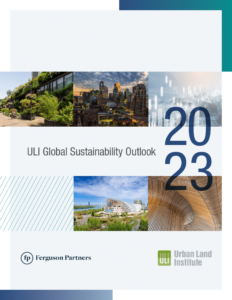 | ULI Global Sustainability Outlook 2023 ULI Global Sustainability Outlook 2023 looks at the five key issues affecting sustainability in real estate and land use decision-making for the year ahead. In collaboration with Ferguson Partners and based on interviews with the ULI Americas Sustainable Development Council, ULI Asia Pacific Resilient Cities Council, and ULI Europe Sustainability Council the outlook looks at: what sustainability topics and issues are on the rise, why do they matter, and what actions should the industry pursue moving forward. |
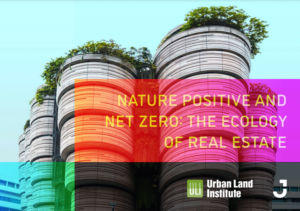 | Nature Positive and Net Zero In partnership with research sponsor and partner Jacobs, Nature Positive and Net Zero: The Ecology of Real Estate highlights key global market drivers for developers and owners to preserve and enhance biodiversity in development as part of their overall climate strategy, and provides guidance for owners and developers on best practices for implementing nature positive solutions at multiple scales. |
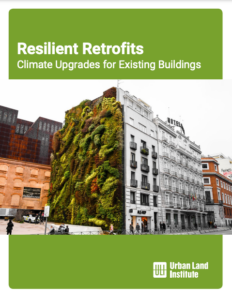 | Resilient Retrofits: Climate Upgrades for Existing Buildings Resilient Retrofits: Climate Upgrades for Existing Buildings introduces real estate actors, designers, policymakers, and finance professionals to the opportunities and challenges of preparing existing buildings for accelerating physical climate risks, including extreme temperatures, floods, storms and high winds, seismic risks, water stress/drought, and wildfires. |
 | Environmental Justice and Real Estate Environmental Justice and Real Estate: Perspectives from Leading Community-Based and Advocacy Organizations features interviews with leaders from the Fifth Avenue Committee, Catalyst Miami, Initiative for Energy Justice, and The Greenlining Institute, and seeks to elevate these perspectives to help built environment professionals address the effects of structural racism and community disinvestment through the perspective of environmental justice. Environmental justice has become a key policy lens to examine and address how low-income communities and communities of color have been disproportionately affected by real estate and land use decisions and environmental hazards. |
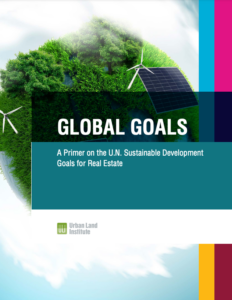 | Global Goals: A Primer on the U.N. Sustainable Development Goals for Real Estate In 2015, the United Nations released the 2030 Agenda for Sustainable Development, which included 17 Sustainable Development Goals (SDGs), to end poverty while also improving global health, reducing inequality, and protecting the planet. Adopted by all U.N. Member States, the SDGs require the support of both the public and private sector to achieve and have become a common framework for governments and businesses to use for communicating their ESG initiatives. Global Goals: A Primer on The U.N. Sustainable Development Goals for Real Estate provides a general overview of why real estate firms are aligning with the SDGs, how they assess which of the SDGs are relevant to their business, how they align with the SDGs, and how they are being reported on, using current examples from the industry. |
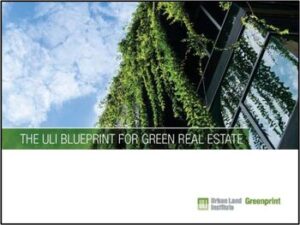 | The ULI Blueprint for Green Real Estate Building on the leading sustainability work that ULI Greenprint member organizations have been implementing since 2009, the ULI Blueprint for Green Real Estate report helps real estate owners and investors create or accelerate a sustainability program, and developers looking for ways to integrate sustainability into their overall development strategy. The resource is focused on real estate addressing environmental areas—energy, water, waste, and greenhouse gas (GHG) emissions—while acknowledging that the role of a real estate sustainability program is much broader than it once was, now encompassing topics like resilience, health and wellness, and social equity. |
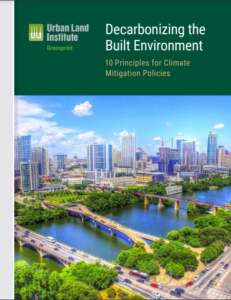 | Decarbonizing the Built Environment With leading cities refining their climate action plans and hundreds of more cities preparing to develop plans, the public and private sectors can unite around a set of principles to help accelerate progress toward these shared climate action goals. This recent report from ULI Greenprint, prepared in partnership with USDN, serves as a starting point for cities interested in engaging real estate leaders during the shaping of climate mitigation policies, and for real estate organizations to increase their understanding of the potential impact of these policies—providing useful tools to help city officials and those in the real estate industry engage with each other in a meaningful and ongoing way. |
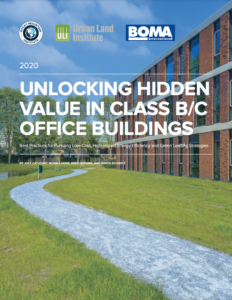 | Unlocking Hidden Value in Class B/C Office Buildings This report assesses hows how improving the energy efficiency of Class B and C office buildings is doable with relatively simple, lower-cost measures that not only enhance building performance, but boost property values to make the buildings more competitive. |
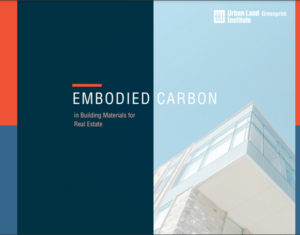 | Embodied Carbon in Building Materials for Real Estate This report prepares the real estate market for a low-carbon materials future, makes the business case for why real estate should pay attention, highlights smart steps to reduce embodied carbon, and showcases peers already addressing the issue. |
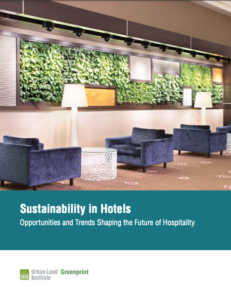 | Sustainability in Hotels: Opportunities and Trends Shaping the Future of Hospitality This report assesses the state of sustainability in the hotel sector, identifying best practices in energy efficiency, water conservation, and waste reduction; highlighting industry trends to watch; and finding solutions for obstacles to sustainability, with a goal of accelerating the market’s move toward a more sustainable and impactful future. |
 | Renewable Energy Strategies for Real Estate The path to decarbonization in real estate requires the integration of a renewable energy strategy, including both installed onsite and purchased offsite clean power. There is a strong business case for renewable energy, including lowering energy costs or reducing cost volatility, strengthening the utility grid, improving resilience, meeting net zero goals, and increasing tenant demand. However, there are challenges to assessing opportunities, deal structures, and financing mechanisms that limit market uptake. The Renewable Energy Strategies for Real Estate Report aims to help real estate practitioners understand the business case for renewables and develop a strategy to identify, prioritize, and execute renewable energy deals both on site and off site.
|
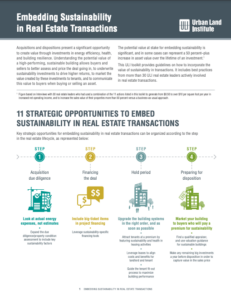 | Embedding Sustainability in Real Estate Transactions This ULI toolkit provides guidelines on how to incorporate the value of sustainability in transactions. It includes best practices from more than 30 ULI real estate leaders actively involved in real estate transactions. |
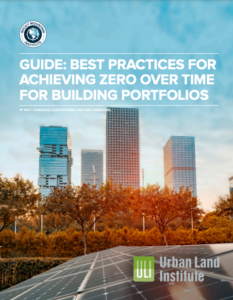 | Best Practices for Achieving Zero Over Time For Building Portfolios In partnership with the Rocky Mountain Institute this report outlines our zero-over-time (ZOT) approach to help portfolio owners navigate the barriers to achieving net zero energy by providing a roadmap to achieve cost-effective deep energy retrofits over time. |
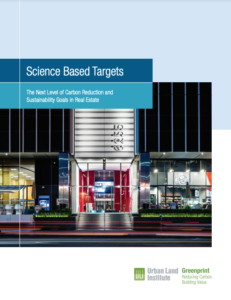 | Science Based Targets: The Next Level of Carbon Reduction and Sustainability Goals in Real Estate retrofits over time As companies continue to push the envelope on global sustainability in the built environment, some are looking to a new movement, the Science Based Targets initiative (SBTi), to calculate and drive their long-term goals. |













